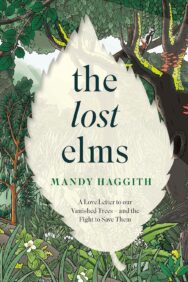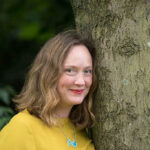‘Stand under a tree and exchange breath with it. We are part of nature and the rest of nature is all around us.’
Mandy Haggith has turned her writing pen to a gorgeous appreciation of Elm trees and their place in our culture and natural history. BooksfromScotland wanted to know more about this particular natural love affair.
The Lost Elms – A Love Letter to Our Vanished Trees – and the Fight to Save Them
By Mandy Haggith
Published by Wildfire Books
Hello Mandy, congratulations on the publication of your latest book, The Lost Elms. What can you tell our readers about it?
Well, the subtitle, ‘A love letter to our vanished trees – and the fight to save them’ sums it up. It’s a book born out of my life-long passion for trees, which began in the woods close to where I grew up in Northumberland. The book threads together the personal meaning elms have had in my life together with their wider, cultural connections around the planet, while telling the story of how the Dutch elm disease pandemic has affected them. It’s a mix of memoir, arts and science.
You’re a great lover and activist for the natural world. What drew you to explore Elm trees in particular? And why do you think they’ve had such a large space in cultural history?
When I was a young child all the elm trees in the woods I played in died of Dutch elm disease, which made a big impression on me. The disease has been spreading north slowly, as the climate warms enough for the beetles that spread it to shift north. Now I live in Assynt, in the northwest Highlands, where we still have healthy elms, but maybe not for much longer, so I feel like my life journey has run parallel to this threat to the elms. The book came about because in 2022, the oldest elm in Europe, at the gateway to the Beauly Priory, succumbed to the disease and I was asked to write an elegy for it. That poem caught the interest of Wildfire Books, who had seen that elms have a huge significance culturally. Elms have many practical uses and they are also valued in many cultures as symbols of mourning but also of marriage, of loss but also of comfort. In this time of environmental grief, elms offer us hope.
Are you hopeful that we can bring back what has been lost in our natural world?
Yes, although this book tells a story of loss of hundreds of millions of trees across the world, it is also a tale of hope. There are elms that are resistant to the disease and scientists are working hard to propagate those resilient trees, plus elms have suffered catastrophic declines in the past and bounced back. They can teach us a lot about resilience.
You’ve written fiction and poetry too. Can you tell us about working across genres in your writing practice?
Poetry is at the heart of my creative practice, but sometimes I want to write something that won’t fit into the confines of a poem. A key difference between poetry and prose for me is how much research is involved – poetry generally emerges spontaneously from my lived experience, while both fiction and non-fiction come from disciplined daily practice embedded in lots of research. I love research and writing information-rich non-fiction essays and articles, and if I get stuck into a topic and the obsession builds sufficiently, depending on how speculative I am being, it can become either a novel or a non-fiction book. I find that it’s best to let the subject matter be in charge of the genre.
Not only have you had a varied writing career, but your non-writing career has been characterised by change and pivoting. You previously worked in Artificial Intelligence. What are your thoughts on where AI is heading today?
I did my PhD in AI back when it was a new-fangled thing in the 1990s. I used to joke that my research question was ‘Can AI help save the planet?’ and I quit the field in the early noughties when I realised the answer was ‘No’! I was really worried then about the ethics of AI and, in particular, who owned and controlled the technology, and I think my concerns have largely been vindicated. Governments have failed to get a grip on regulating this industry effectively, there is little effort to rein-in the corporations responsible for AI and the results include outrageous copyright thefts for training large language models and a runaway train of potential misuse. I’m no luddite, and I believe we could harness the power of computation for socially benign purposes, but I don’t think we’re achieving a good balance between the risks and benefits of this technology.
You love travelling and sailing too. How do you fit in these activities around your writing and teaching?
I used to travel a lot when I worked as a forest activist but for the past decade I’ve become seriously addicted to sailing. Since I got a job teaching I get long summer holidays, which is a boon!
What advice would you give to young people and city dwellers in appreciating nature if they’ve not had the opportunity before?
Breathe in – wherever you are, you’re absorbing the out-breaths of plants. Breathe out – you’re sharing your breath with the rest of the natural world. Stand under a tree and exchange breath with it. We are part of nature and the rest of nature is all around us. It is within us and we are within it, it doesn’t judge us and it’s free!
The Lost Elms – A Love Letter to Our Vanished Trees – and the Fight to Save Them by Mandy Haggith published by Wildfire Books, priced £22.
ALSO IN THIS ISSUE

 Women Who Dared: From the Infamous the Forgotten
Women Who Dared: From the Infamous the Forgotten
‘”Men have made a more comfortable world for boys and men than for girls and women; and the women no …

 The Man on the Endless Stair by Chris Barkley
The Man on the Endless Stair by Chris Barkley
‘I reached out with my good arm and held it inches from the doorknob. What would I find on the other …













